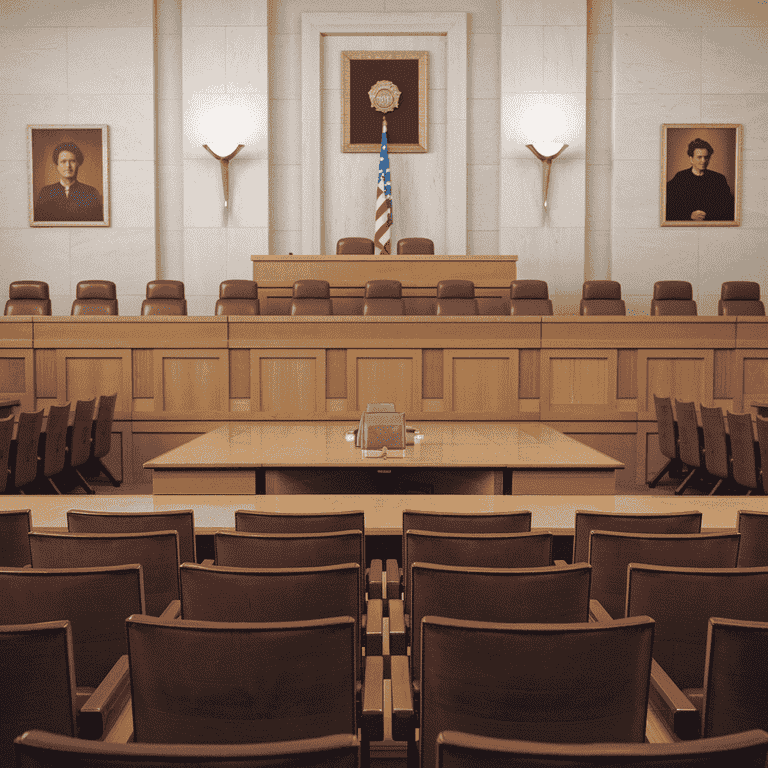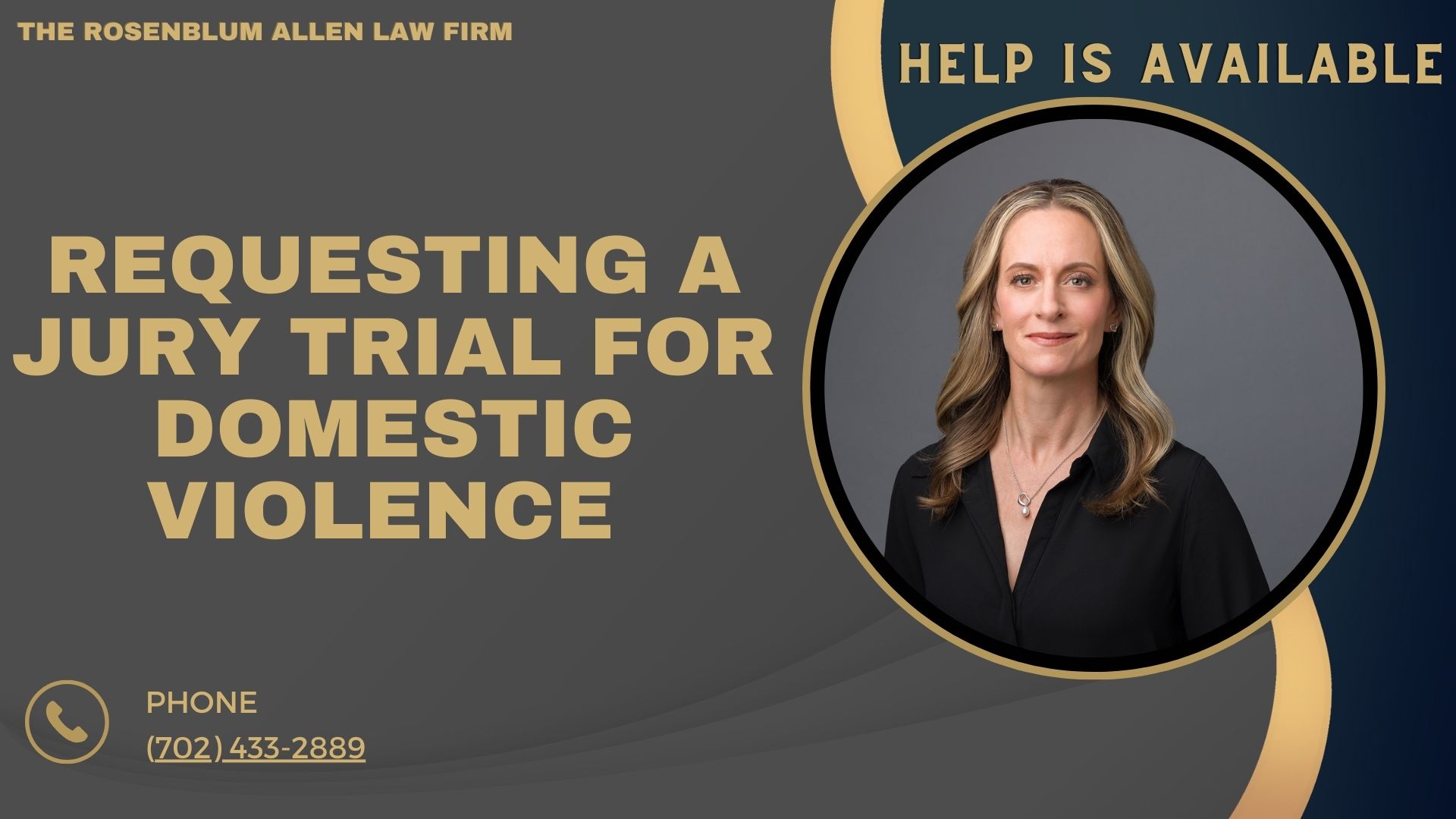A jury trial involves presenting your case to a group of people—typically 6 to 12—chosen from the community to hear the evidence and determine your guilt or innocence. The jurors listen to the testimony, review evidence, and reach a unanimous or majority verdict based on what has been presented in court.
Bench Trial vs. Jury Trial
In a bench trial, only the judge hears the evidence and decides. A jury trial, however, puts the power in the hands of selected jurors. A bench trial may move faster but could limit how your case is perceived, as the judge alone will assess the legal and emotional aspects of the case.
 Eligibility for a Jury Trial in Domestic Violence Cases
Eligibility for a Jury Trial in Domestic Violence Cases
Varying State Laws
Domestic violence charges can vary from misdemeanors to felonies. Whether or not you are entitled to a jury trial largely depends on the laws of your state. In some states, a jury trial is available for felony-level domestic violence cases but not for misdemeanor charges. Other states allow jury trials even for misdemeanors, but this is less common.
Types of Charges That Allow for Jury Trials
Typically, higher-level misdemeanors or felony charges related to domestic violence are eligible for a jury trial. Misdemeanors, especially first-time offenses, might not grant an automatic right to a jury, meaning a bench trial could be your only option unless exceptional circumstances allow for a jury.
Pros of Requesting a Jury Trial
Potential for Sympathetic Jurors
Community Representation
One of the most notable advantages of a jury trial is that your case is heard by a group representing a cross-section of the community. This group will more likely bring many experiences and attitudes to the courtroom. A jury trial could be advantageous if you feel your story might resonate more with community members than a judge.
Emotional Appeals
Unlike a judge, who may hear dozens of domestic violence cases yearly, a jury will approach your case with fresh eyes. Jurors might be more responsive to emotional arguments or the human side of your story, especially if mitigating factors or complex relationship dynamics are involved.
Protection Against Bias
Guarding Against Judicial Bias
Judges are human, and while they strive for objectivity, they may bring certain biases to the bench, especially if they have seen many domestic violence cases with similar patterns. A jury trial offers protection against this potential bias, as multiple people will weigh the evidence.
Fresh Perspectives
Each juror brings their unique perspective to the case. This diversity in thought may be beneficial if your defense relies on convincing others of circumstances that a single judge might overlook or undervalue. With a jury, there’s an opportunity to persuade multiple individuals who might be more open to alternative interpretations of events.

Cons of Requesting a Jury Trial
Time and Costs
Length of the Trial
Jury trials generally take longer to complete than bench trials. Selecting a jury, giving them instructions, and ensuring that the case is presented in an understandable way to people without legal training adds time. A bench trial may be preferable if you’re looking for a quick resolution.
Higher Legal Costs
Because jury trials require more time, they can also lead to higher legal fees. The process involves extra steps such as jury selection, longer trial durations, and more in-depth trial preparation, which can add to the cost.
Risk of Emotional Decisions
Jury’s Lack of Legal Expertise
Judges have years of legal training and experience, allowing them to evaluate evidence and testimony within a legal framework. Jurors, on the other hand, may not have any legal background and could base their decisions more on emotions than the law. This can be risky in a domestic violence case where emotions already run high.
Jury Biases
Though jurors are vetted during the selection process, there’s no guarantee that biases won’t still be present. Jurors might come with preconceived notions about domestic violence, particularly about gender roles or family dynamics, which could work against you.
Factors to Consider Before Requesting a Jury Trial
Strength of Evidence
Is the Evidence Strong Against You?
If the evidence overwhelmingly supports the prosecution’s case, a jury trial might not be the best option. Jurors may be more likely to convict if they feel that the evidence shows a clear pattern of behavior, especially in domestic violence cases where emotions often play a significant role in decision-making.
Credibility of Witnesses
If the prosecution’s witnesses are not credible or have reasons to lie, a jury might be more open to hearing your defense. The way witnesses present themselves and their emotional impact can be crucial in a jury trial, and a jury might be more persuaded by witness credibility than a judge, who is more likely to focus on legal technicalities.
Complexity of Your Case
Legal Complexity
Some domestic violence cases involve legal arguments that are complex and may be difficult for a jury to grasp fully. For example, a bench trial may be more appropriate if your defense hinges on technical legal issues, such as how evidence was gathered or presented. Judges are better equipped to deal with complex legal matters and might be more likely to rule in your favor if the case is legally complicated.
Emotional Complexity
On the other hand, if your case involves emotional aspects—such as mutual conflict, past trauma, or family history—a jury might be more sympathetic to your side of the story. In such situations, presenting your case to a jury may allow you to appeal to their emotions, whereas a judge might focus solely on the legal facts.

Public Perception
Media Involvement
In some domestic violence cases, public perception and media attention can be significant factors. A jury might be more influenced by public opinion or media portrayal of domestic violence issues. If your case has received media attention or if you believe that the broader community might be biased against domestic violence defendants, this could influence the jury’s decision-making process.
Privacy Concerns
Jury trials tend to be more public than bench trials, which may expose you to unwanted attention. A bench trial might offer a more discreet option if you’re concerned about keeping your personal life and case details more private.

Weighing the Pros and Cons
Deciding whether to request a jury trial for your domestic violence case requires careful consideration of the specifics of your situation. Jury trials offer the possibility of sympathetic jurors and protection against judicial bias, but they can also be more time-consuming, costly, and unpredictable. If your case involves vital emotional elements or if you believe a jury might view your situation more favorably than a judge, a jury trial may be a good option. However, if the evidence against you is strong or the case is highly technical, a bench trial may provide a more straightforward path to resolution.
Consulting With Your Attorney
Ultimately, the decision to request a jury trial should be made with the guidance of your attorney. They can assess the strength of the evidence, the complexity of your case, and your likelihood of success with either a jury or a judge. Every case is unique, and your attorney will help you determine which option best suits your defense strategy and goals.

Frequently Asked Questions
What is a jury trial in a domestic violence case?
A jury trial involves a group of individuals from the community who listen to the evidence and decide whether you are guilty or not guilty. Unlike a bench trial, where the judge makes the decision, a jury trial relies on a collective decision from the jurors.
Can I always request a jury trial in a domestic violence case?
Not always. Whether you can request a jury trial depends on your state’s specific charges and laws. Felonies and some higher-level misdemeanors typically allow for jury trials, but lower-level misdemeanors may not.
What are the benefits of requesting a jury trial?
A jury trial allows your case to be heard by individuals who may be more sympathetic and bring diverse perspectives. It can also protect against potential bias from a judge who frequently handles domestic violence cases.
What are the drawbacks of requesting a jury trial?
Jury trials tend to take longer and are more expensive. Jurors might also make decisions based on emotions rather than legal facts, and there’s always the risk of juror bias in domestic violence cases.
How does a jury trial compare to a bench trial?
In a bench trial, the judge alone reviews the evidence and decides. Bench trials are generally faster and less costly but may not provide the same opportunity to appeal to emotions or benefit from multiple perspectives as a jury trial.

Further Reading
It’s important for our readers to know that our lead attorney, Molly Rosenblum Allen, Esq., is not just a professional in the courtroom but has also created a series of comprehensive resources to assist those navigating the complexities of domestic violence cases. These resources provide valuable information and guidance:
Domestic Violence Lawyer in Las Vegas: A specialized service offering effective legal assistance for those facing domestic violence charges in Las Vegas. More information is available here.
Understanding Domestic Violence in Las Vegas: A detailed exploration of the legal landscape surrounding domestic violence in Las Vegas, offering insights and advice. Learn more here.
Domestic Violence Plea Bargain: An in-depth look into the plea bargain process in domestic violence cases, providing crucial information for those considering this route. Find out more here.
How to Get Domestic Violence Charges Dismissed: A strategic guide for those seeking to have their domestic violence charges dismissed, outlining necessary steps and legal nuances. Access the guide here.
How to Get Your Gun Rights Back After a Domestic Violence: A resource for individuals looking to restore their gun rights following a domestic violence incident, detailing the essential steps and legal considerations. Read more here.
What are the Chances of Beating a Domestic Violence Charge in Nevada?: An analytical perspective on the probabilities and factors involved in successfully defending against a domestic violence charge in Nevada. Find the analysis here.
Molly Rosenblum Allen, Esq. is committed to providing not only legal representation but also valuable resources to empower and inform those facing domestic violence charges. These resources reflect her dedication and expertise in this challenging field.

Offsite Resources You May Find Helpful
Here are seven offsite resources that provide information about domestic violence cases, jury trials, and related legal strategies:
American Bar Association: The ABA provides a plethora of resources on a variety of legal topics, including the advantages and disadvantages of jury trials.
FindLaw: This online resource provides free legal information, a lawyer directory, and other resources on a wide range of legal topics, including considerations for requesting a jury trial in a domestic violence case.
Justia: A platform that provides free legal information and a directory of attorneys for various legal issues, including domestic violence cases and jury trials.
Nolo: This website offers legal information to consumers and small businesses, including articles, blogs, FAQs, and news on criminal law and court procedures.
Avvo: This website provides a directory of lawyers, legal advice, and other resources on a broad range of legal topics, including the decision to request a jury trial.
LegalZoom: An online legal technology company that provides legal information and services to consumers and small businesses, including guidance on dealing with legal proceedings.
National Domestic Violence Hotline: This national hotline provides 24/7 support to victims and survivors of domestic and intimate partner violence. While not a legal resource, it provides crucial support and resources for individuals facing domestic violence charges.
Why You Still Haven't Hired a Las Vegas Domestic Violence Defense Attorney Yet
Watch this short video to take the next big step toward defending your rights against your domestic violence charge.

What's Next?
Las Vegas residents searching for the right Las Vegas criminal defense attorney?
Look no further!
At The Rosenblum Allen Law Firm, we have years of experience and expertise in defending our clients in court.
Our team is committed to providing a safe and reliable service that will give you the confidence you need when facing challenging legal issues.
We understand how stressful it can be, so let us help make this process easier for you by using our top-notch services!
Contact us today at (702) 433-2889 to start your journey towards justice with The Rosenblum Allen Law Firm – because everyone deserves their day in court!






